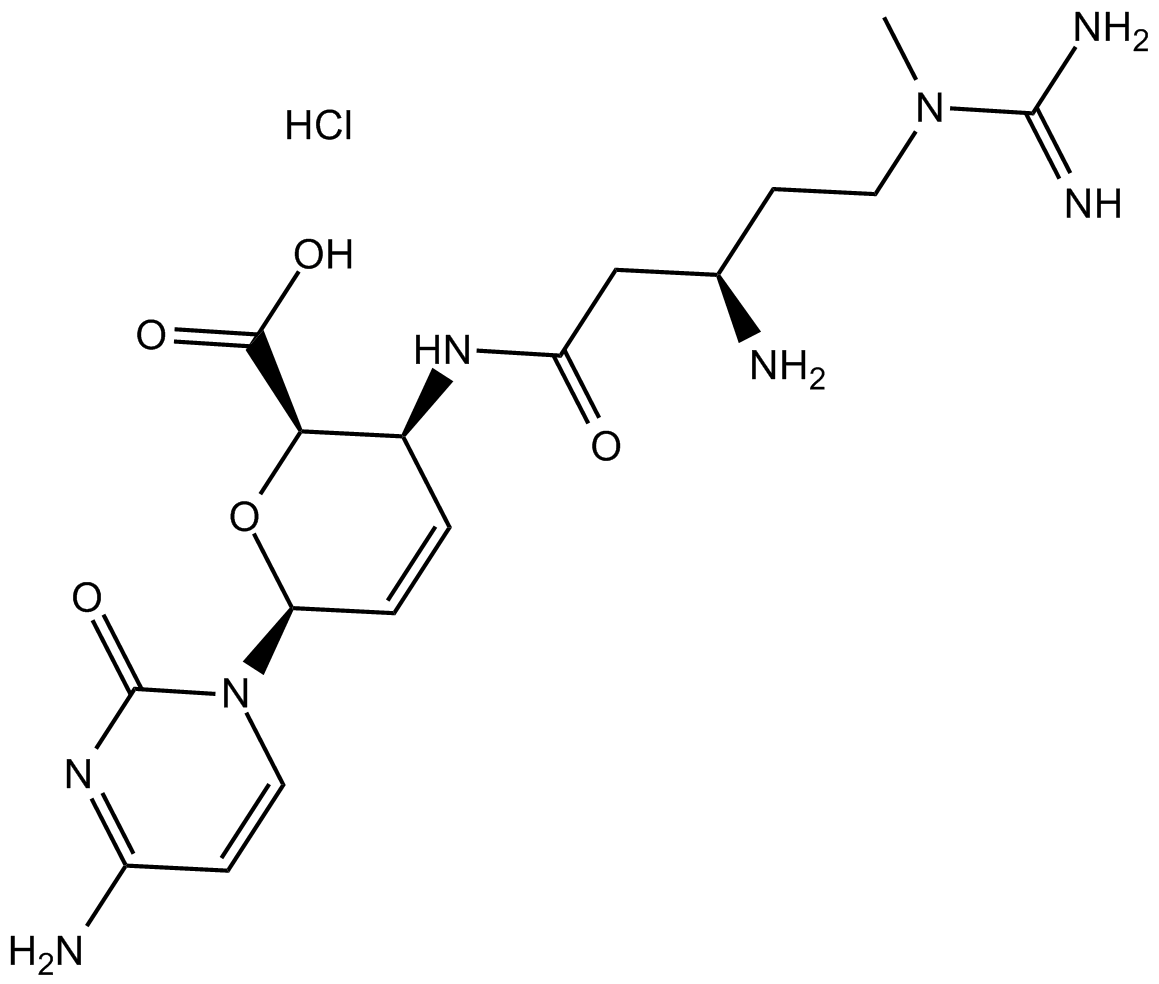Blasticidin S HCl |
| Catalog No.GC18094 |
Blasticidin S HCl is a nucleoside antibiotic isolated from Streptomyces griseochromogenes[1].
Products are for research use only. Not for human use. We do not sell to patients.

Cas No.: 3513/3/9
Sample solution is provided at 25 µL, 10mM.
Blasticidin S HCl is a nucleoside antibiotic isolated from Streptomyces griseochromogenes[1]. Blasticidin S HCl specifically inhibits protein synthesis in prokaryotic or eukaryotic cells by interfering with ribosome binding peptides. The inhibitory effect of Blasticidin S HCl on translation termination is conserved in eukaryotes and bacteria[2-4].
Blasticidin S HCl treatment stabilizes the premature stop codon-mutated mRNA in HeLa cells, Blasticidin S HCl inhibits nonsense-mediated mRNA decay and, at subinhibitory concentrations, modulates translation dynamics at premature termination codons leading to enhanced protein production[5]. The presence of Blasticidin S HCl protects DNA from Cu(II) -induced damage[6].
References:
[1]. TAKEUCHI S, HIRAYAMA K, et,al. Blasticidin S, a new antibiotic. J Antibiot (Tokyo). 1958 Jan;11(1):1-5. PMID: 13525246.
[2]. Svidritskiy E, Korostelev AA. Mechanism of Inhibition of Translation Termination by Blasticidin S. J Mol Biol. 2018 Mar 2;430(5):591-593. doi: 10.1016/j.jmb.2018.01.007. PMID: 29366636; PMCID: PMC5831496.
[3]. Kinoshita T, Tanaka N, et,al. Binding of blasticidin S to ribosomes. J Antibiot (Tokyo). 1970 Jun;23(6):288-90. doi: 10.7164/antibiotics.23.288. PMID: 4917792.
[4]. Svidritskiy E, Ling C, et,al. Blasticidin S inhibits translation by trapping deformed tRNA on the ribosome. Proc Natl Acad Sci U S A. 2013 Jul 23;110(30):12283-8. doi: 10.1073/pnas.1304922110. Epub 2013 Jul 3. PMID: 23824292; PMCID: PMC3725078.
[5]. Powers KT, Stevenson-Jones F, et,al. Blasticidin S inhibits mammalian translation and enhances production of protein encoded by nonsense mRNA. Nucleic Acids Res. 2021 Jul 21;49(13):7665-7679. doi: 10.1093/nar/gkab532. PMID: 34157102; PMCID: PMC8287960.
[6]. Stokowa-Sołtys K, Jeżowska-Bojczuk M. A rice fungicide blasticidin S efficiently binds Cu(II) ions and prevents DNA from metal-induced damage. J Inorg Biochem. 2013 Oct;127:73-8. doi: 10.1016/j.jinorgbio.2013.06.014. Epub 2013 Jun 29. PMID: 23880034.
Average Rating: 5 (Based on Reviews and 3 reference(s) in Google Scholar.)
GLPBIO products are for RESEARCH USE ONLY. Please make sure your review or question is research based.
Required fields are marked with *




















